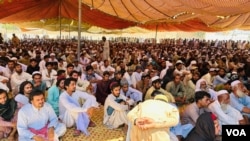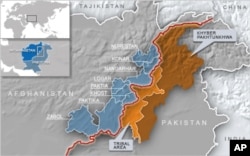“We don’t need development. … We want to live in peace,” a frustrated Abdul Khaliq told VOA over the phone.
Khaliq is a resident of Pakistan’s tribal district Kurram, where locals held a consultative gathering, or jirga, earlier this month to discuss rising insecurity. The gathering was part of a recent wave of jirgas in Pakistani areas close to Afghanistan, where locals say they are caught between militant violence and military operations.
In recent weeks, along with Kurram, tribes gathered in large numbers in the Mohmand, Tank, Bannu and Lakki Marwat districts in the country’s northwestern Khyber Pakhtunkhwa province. The jirgas were held amid a spike in incidents involving targeted killings and extortion by militants.
“We are not afraid for ourselves, but we are scared for our children and families,” a resident of Mohmand who did not want to be identified for security reasons told VOA over the phone. Militants set his cousin’s marble factory on fire in May, after the businessman rebuffed extortion demands.
“Two days before the incident they warned the factory watchman to tell my cousin to resolve the problem. They used to send the messages through WhatsApp voice notes as well, and would call, too, but my cousin wouldn’t take the calls,” he said.
Mohmand is home to dozens of marble factories. After the incident, owners complaining of extortion calls and threats of violence from militants held a protest sit-in for five days. They ended it only after government officials promised more police presence in the industrial area.
Residents told VOA it’s not always clear if the threats are from Tehrik-e-Taliban Pakistan fighters, TTP affiliates or criminals posing as Islamist militants. However, they blame the rise in militant activity on the February 2020 deal between the United States and the Afghan Taliban that saw the insurgents return to power in August 2021. Many also hold responsible Pakistan’s controversial step to allow the return of thousands of TTP fighters who had been forced into Afghanistan by military operations.
Afghan Taliban-mediated talks between Pakistan and the TTP broke down in November 2022. Faced with frequent terror attacks, Islamabad accused the Afghan Taliban of providing sanctuary to the leaders of the TTP, a globally designated terrorist organization. Kabul denies the allegation.
Harassment by military
Residents in areas close to the Afghan border complain militants also frequently barge into homes and businesses, demanding food and tea. Obliging them, they say, gets them into trouble with security agencies deployed in heavy numbers in the region.
“Our problem is that at night armed men come to our homes, demanding food, and in the morning the military comes and takes the homeowner away [for interrogation],” said Pattu Lala Bittani, who took part in a massive jirga in district Tank this month. The gathering was held after a spate of militant attacks on ordinary citizens, government employees and security personnel.
“Talking to Taliban puts us in a bad position with them [security institutions], and if we go to state authorities, then we get on the bad side of the Taliban,” Bittani said.
State response
“When you do counterterrorist operations in civilian-friendly population, it has negative manifestations, one of which is this,” said Muhammad Ali Saif, adviser to the Khyber Pakhtunkhwa chief minister on information, conceding that civilians face harsh treatment from security institutions for coming into contact with militants.
“It is difficult to do everything by the book. Mishaps occur, people get harassed, but there is a mechanism,” he told VOA. “Security agencies also don’t have some spiritual information on who is colluding with whom.”
He pointed out that monetary compensation is available for civilians in case of physical or financial harm during military operations.
Pakistani security forces are also coming under frequent, deadly attacks as they fight the militancy, which has spread from former tribal areas to settled areas, Saif said.
Dozens of military personnel, including officers, and at least 70 police have died in terror attacks and counterterrorism operations in Khyber Pakhtunkhwa province so far this year. A midyear report of the provincial counterterrorism department released this month recorded at least 237 terrorism incidents. It said 299 terrorists were arrested, while 117 were killed.
Pakistani military spokesperson Major General Ahmed Sharif Chaudhry told the media last month that security forces had conducted more than 13,000 intelligence-based operations this year, mostly in Khyber Pakhtunkhwa and Balochistan.
Fear of displacement
Locals worry the rise in military operations may force them to leave their homes. Hundreds of thousands of Pakistanis became internally displaced persons, or IDPs, when the military conducted massive operations against terrorists between 2009 and 2015.
“The security checks that happen, the check posts on the roads, it makes us feel that things are sliding back to how they were in 2009 when we all became IDPs,” said Abdul Khaliq, who had to leave his home in Kurram at the time. “The commotion we are seeing again, it makes us feel that we are again being pushed back into that era.”
Saif said such fears are unfounded because authorities are conducting limited operations. He said he was not aware of any plans for a massive operation that would require moving residents.
On Friday, residents of the Lakki Marwat district, which is around 300 kilometers (186 miles) southwest of the capital, Islamabad, blocked a highway to protest an ongoing counterterrorism operation. The security action came after seven soldiers, including an officer, were killed in a roadside bombing. Just days later, the Pakistani military claimed killing 11 terrorists in response.
The decline in security has Abdullah Nangiyal Bittani, who attended the jirga in Tank roughly 90 kilometers (56 miles) from Lakki Marwat, wondering if he should go to his village to celebrate Eid with extended family on Monday.
“I would be in my village for four or five days every month,” said Bittani, who lives in Islamabad. “But now it’s been two to three months since I last visited.
“We expect the state will protect us,” Bittani said. “We should have peace in our areas like there is peace in other parts of the country.”













